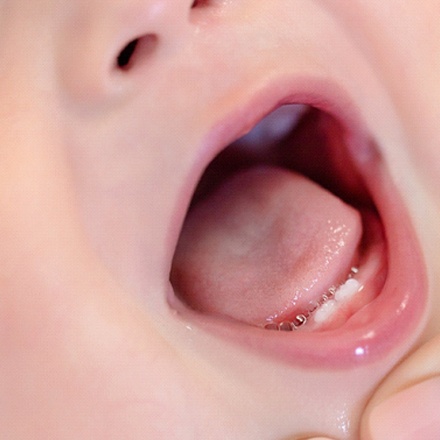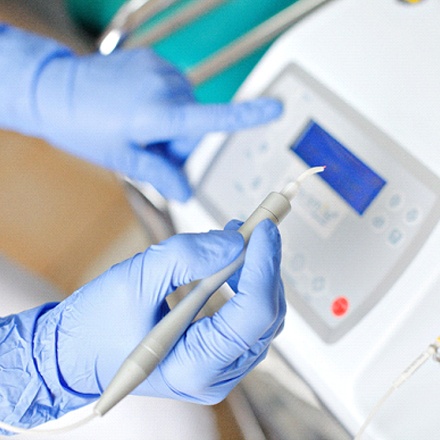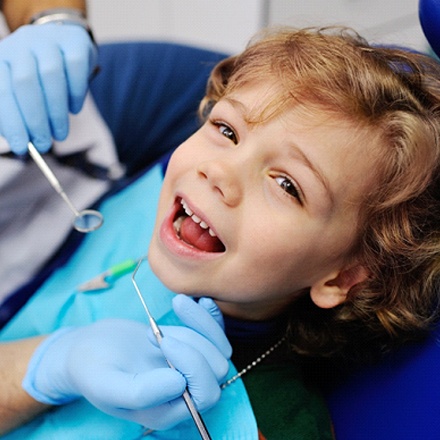As a parent, you notice the little things your baby does. Lately, you’ve been noticing some odd habits like clicking and suckling while they’ve been feeding. You want them to grow up happy and healthy and have the foundation they need to maintain their precious smile for years to come. When you start doing some research, you find that children often have lip and Tongue-Ties that can affect their ability to feed. Fortunately, your dentist can help. Read on to learn about what a laser frenectomy is and how it could benefit your little one.
Infant Laser Frenectomy – Chicago, IL
Freedom from Lip and Tongue-Tie

What Is a Frenectomy?

A frenulum is an oral tissue that connects each lip to the gums, and the tongue to the mouth floor. Sometimes, these tissues can cause a baby to have difficulty feeding because they restrict their oral movement. When this happens, we can loosen or remove these troublesome tissues in a procedure called a frenectomy.
In the past and even now at some practices, this treatment involved the use of a scalpel and stitches, but here at Chicago Pediatric Dentistry & Orthodontics, we use a Light Scalpel CO2 dental laser. This allows us to gently sever the extra thick tissue that needs to be treated without altering any surrounding oral tissue. In many cases, we don’t even need to administer sedation of any kind. The precision of this instrument also provides for a faster and easier recovery for your baby. In a matter of minutes, your infant’s ability to feed can be drastically improved without any incisions or stitches.
Types of Frenectomies and Frenuloplasties

During a laser frenectomy, a dentist removes a frenulum altogether. During a laser frenuloplasty, the frenulum is merely altered to the point where it no longer restricts proper movement of the oral structures. Although these procedures can be performed on either children or adults, they’re most often done for children, typically within the first year of their life. Treating children with lip or Tongue-Tie early in their life can prevent future complications.
Lip-Tie Care
While nursing, an infant needs to be able to breathe through their nose and the upper lip must be flexible enough to flange back toward the tip of the nose. If this doesn’t occur, then the infant can struggle with breastfeeding. But a simple exam, wherein we roll the upper lip up to the tip of the nose, can help us determine whether a laser procedure is necessary.
Tongue-Tie Care
Although more challenging to detect to the untrained eye, a Tongue-Tie, or restrictive tongue frenulum, prevents proper functioning, which can impact breastfeeding, eating solid foods, and potentially speech down the road. By loosening or severing the excess tongue frenulum, we can enable your baby’s tongue to move as needed with almost immediate improvement.
Why a Frenectomy Is Needed

Left untreated, lip and Tongue-Tie can lead to a number of issues for your child. For example, they may not be able to latch properly during breastfeeding. As a mother, you experience painful, sore nipples. Such feeding difficulties are only the beginning of the problems that might ensue from lip and Tongue-Tie. As your child grows, they may experience speech problems, have aversions to certain textures of food, and develop an oral myofunctional disorder, such as tongue thrust. Tongue thrust, wherein a person places the tongue too far forward in the mouth, can interfere with normal dental development. Children also often suffer from behavioral issues and lowered self-esteem because the way a lip or Tongue-Tie affects their ability to speak and eat.
Benefits of a Laser Frenectomy

Our gentle, unique approach—combined with our advanced technology—enables us to provide certain benefits when handling lip and Tongue-Ties. These benefits include the following:
- A treatment time of only a couple minutes
- No bleeding or stitches
- Little to no discomfort
- Minimally invasive
- Fast healing and recovery time
- Immediate feeding improvements
In most cases, we recommend breastfeeding immediately after the procedure, not only to help calm and nourish your baby with healing nutrients but also to allow you to see how beneficial this procedure is for your baby’s development and how immediate the results can be.
Frenectomies and Orthodontics

There are a number of ways in which lip and Tongue-Tie can affect a child’s orthodontic development. For example, tongue thrust can cause the jaw to take on an irregular shape as well as cause gaps between the teeth. A thick frenulum that connects to the gums at the level where the teeth emerge can also lead to improper dental spacing.
If your child undergoes a frenectomy early enough, it may be possible to avoid such issues. However, if you child already has many of their teeth, their lip or Tongue-Tie may lead to the need for a more complex treatment plan. Or there may be other factors that cause your child’s teeth to be misaligned even after a frenectomy has been performed. In any case, our Orthodontists, will evaluate such issues and design a treatment plan that may include both a frenectomy and orthodontic intervention.
Visit Chicago Tongue-Tie Center

Navigating the need for lip or tongue-tie treatment can be a confusing process at the start. Let our team help make it simple and stress-free for your family! At our new Chicago Tongue-Tie Center, you’ll have access to true experts, the latest technology, and a comfortable environment where everyone can feel at ease. If you’d like to learn more about what to expect and how to schedule a visit at Chicago Tongue-Tie Center, visit the website below.
Visit Our Chicago Tongue-Tie Center
Frequently Asked Questions about Laser Frenectomies

Before your child undergoes any procedure, we want to make sure you understand everything you want and need to know. Here are our responses to some common questions we get from parents—we hope they put your mind at ease. If you have other questions about your child’s frenectomy, don’t hesitate to contact our practice. We’ll be happy to answer them for you!
Will you put my child to sleep?
In most cases, we do not use sedation for laser frenectomies. This procedure is so gentle that we may not even need to use local anesthetic! During your consultation, we’ll discuss and create a treatment plan customized to your child’s needs and your concerns.
What are other symptoms of tongue or lip ties?
Other than trouble with breastfeeding, symptoms include difficulty eating solid foods, mouth breathing during sleep, speech problems (such as stuttering, lisps, and struggling with bi-labial sounds), and having an open mouth when at rest. If you think your child may need a frenectomy, you can schedule an appointment with us, and we’ll provide honest, helpful insight into your child’s oral development.
How long is the procedure and recovery?
Laser frenectomies usually take around five minutes to complete. However, the appointment could take longer because we want to make sure you’re fully informed and your little one is comfortable before we get started. Recovery time can vary, but your child shouldn’t feel much (if any) discomfort two to five days after the procedure.
How soon after the procedure can I feed my child?
Almost immediately. In fact, breastfeeding soon after the procedure provides your baby with much-needed antibodies and nutrients for healing and kickstarts natural feeding instincts. For toddlers or older children, as soon as the local anesthetic wears off, they are free to eat, but we recommend waiting at least 24 hours before giving them hot, spicy, or cold foods and waiting until the site is fully healed before having hard, crunchy foods.
Will my child need other therapies or treatment after the frenectomy?
In infants, the issue is typically resolved right away, but keep in mind that lactation specialists may be able to offer more guidance and assistance if necessary. If your child is older, they may require additional therapies to address their eating habits, speech patterns, and more. When we evaluate your child, we can recommend treatments and specialists to help your child fully recover and benefit from the procedure.

 1136
S Delano Ct b202,
1136
S Delano Ct b202, (312) 766-0995
(312) 766-0995 Patient Forms
Patient Forms Pay Online
Pay Online